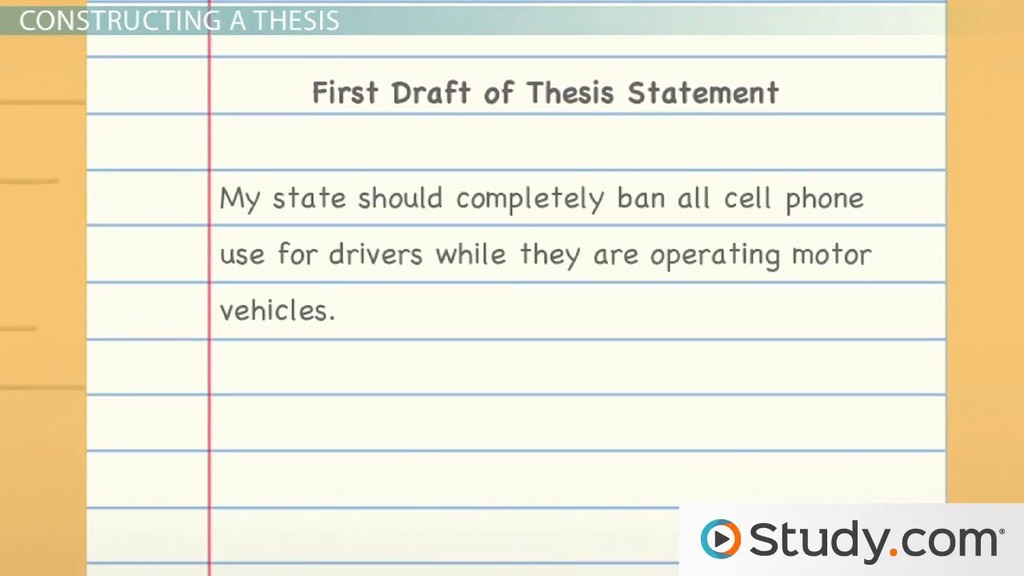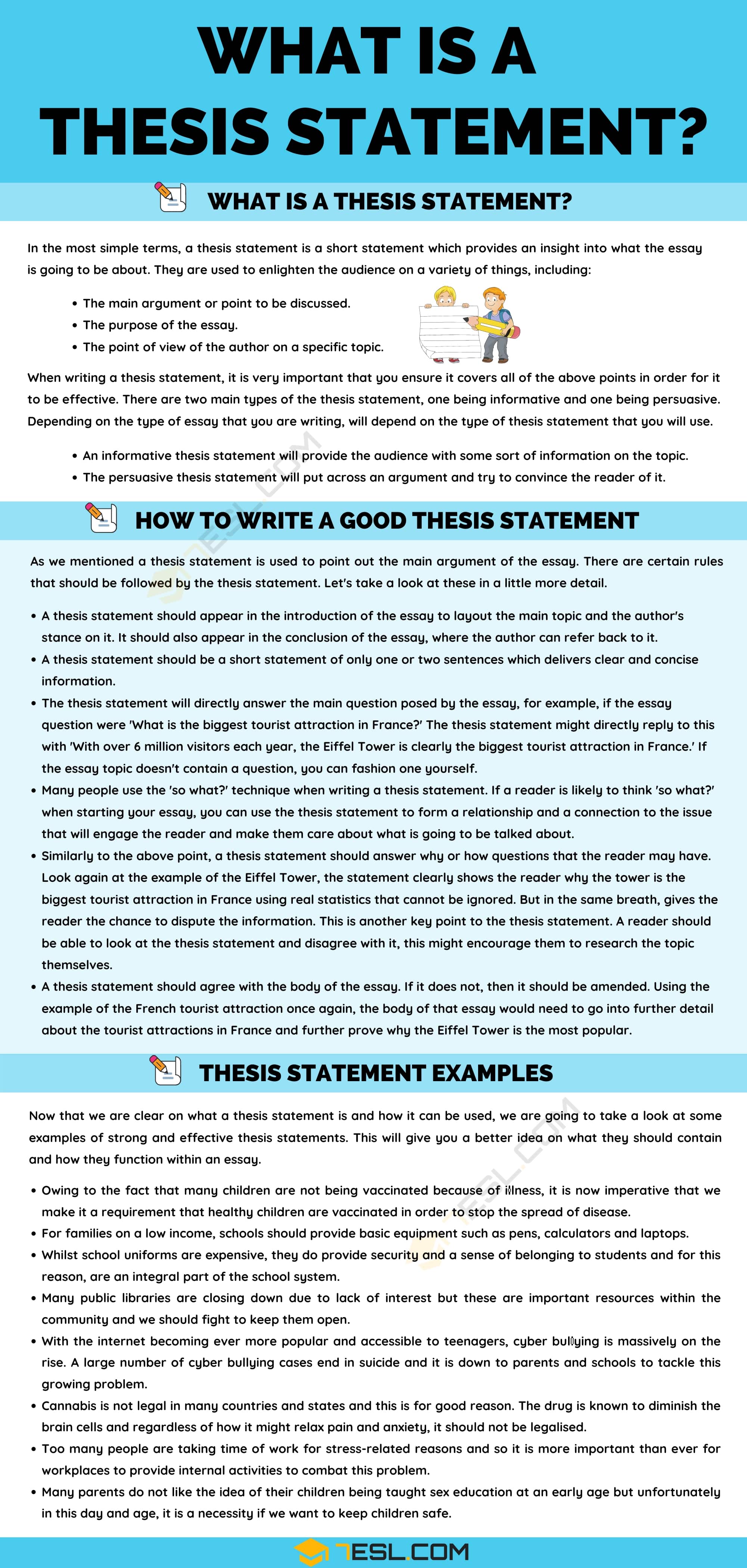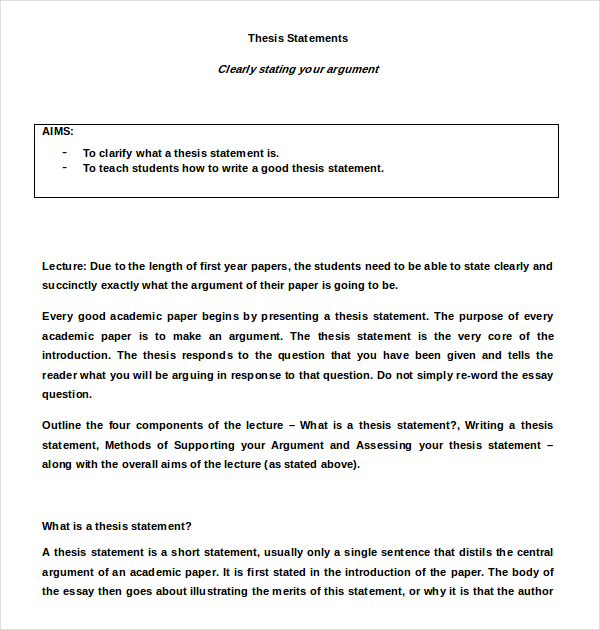
Introduction
When it comes to academic writing, one of the most crucial elements is the thesis statement. It serves as the foundation of your essay or paper, providing a clear and concise summary of the main argument you will be presenting. Understanding how to craft an effective thesis statement is essential for producing high-quality academic work.
Introduction to thesis statements and their importance in academic writing
In academic writing, a thesis statement is a sentence or two that expresses the central point or main argument of your essay. It serves as a roadmap for your readers, guiding them through your thoughts and providing a clear focus for your writing. A well-written thesis statement not only helps you stay on track with your writing but also helps your readers understand the purpose and direction of your work.
An example of a thesis statement could be:
“The use of renewable energy sources is crucial in combating climate change and reducing our dependence on fossil fuels.”
This thesis statement clearly states the main argument of the essay, highlighting the importance of renewable energy sources in addressing environmental concerns. It sets the tone for the rest of the essay, allowing readers to anticipate the supporting points and evidence that will be presented.
In conclusion, understanding how to write an effective thesis statement is vital for academic success. It provides clarity, focus, and direction to your writing, ensuring that your arguments are well-presented and supported. [1][2]

What is a thesis statement?
Explanation of what a thesis statement is and its purpose
When writing an essay or research paper, a thesis statement is a crucial element that expresses the main argument or point you intend to convey in your text. It serves as a roadmap for your readers, guiding them through your ideas and supporting evidence.
A thesis statement should be concise, clear, and specific. It typically appears at the end of your introduction paragraph and sets the tone for the rest of your paper. It helps establish the focus and direction of your writing, ensuring that your arguments are cohesive and well-supported.
The purpose of a thesis statement is to inform your readers about the main idea of your paper and provide them with a preview of the supporting points you will discuss. It helps you stay focused on your topic and prevents your writing from becoming vague or scattered.
Remember, a strong thesis statement is essential for a well-structured and persuasive paper. It should be arguable, provoking thought and inviting discussion. By crafting an effective thesis statement, you can effectively communicate your main argument and engage your readers from the very beginning. [3][4]

Types of thesis statements
Overview of different types of thesis statements (analytical, expository, argumentative, etc.)
When it comes to writing a thesis statement, it's important to understand the different types and how they are used in academic papers. Here is an overview of the main types of thesis statements:
-
Analytical thesis statement: This type of thesis statement presents an analysis or interpretation of a topic. It breaks down the topic into its key components and provides an evaluation or judgment. For example, “The impact of social media on youth mental health can be understood through an analysis of the correlation between excessive screen time and increased anxiety levels.”
-
Expository thesis statement: An expository thesis statement states the topic and lists the key aspects that will be discussed in the paper. It provides a clear and concise summary of the main points. For example, “The history of the Industrial Revolution can be explored through its economic, social, and technological impacts.”
-
Argumentative thesis statement: An argumentative thesis statement presents a claim or position on a controversial issue and provides reasons or evidence to support it. It aims to persuade the reader to agree with the writer's viewpoint. For example, “The government should implement stricter gun control laws to reduce gun violence and protect public safety.”
These are just a few examples of the different types of thesis statements that can be used in academic writing. Remember to tailor your thesis statement to the specific requirements of your paper and ensure it effectively communicates your main argument or analysis. [5][6]

How to create a thesis statement
When writing an essay or research paper, a strong thesis statement is crucial to guide your readers and provide a clear focus for your argument. Here is a step-by-step guide on crafting an effective thesis statement:
Step 1: Understand the assignment
Before you start writing your thesis statement, make sure you fully understand the requirements of your assignment. Identify the topic, purpose, and scope of your paper to ensure your thesis statement aligns with these parameters.
Step 2: Conduct research
Gather relevant information and evidence to support your argument. This will help you develop a well-informed thesis statement that is backed by credible sources and logical reasoning.
Step 3: Identify the main idea
Determine the main idea or central argument of your paper. This should be a concise and specific statement that encapsulates the key point you want to make.
Step 4: Make it debatable
A strong thesis statement presents an arguable claim or position. Avoid stating obvious facts or general statements. Instead, focus on a unique perspective or interpretation that can spark discussion and analysis.
Step 5: Revise and refine
Once you have drafted your thesis statement, review it for clarity, coherence, and relevance. Make necessary revisions to ensure it effectively communicates your main argument and sets the tone for your entire paper.
Remember, a well-crafted thesis statement serves as a roadmap for your essay, guiding both you and your readers throughout the writing process. Take the time to develop a strong thesis statement that captures the essence of your argument and sets the stage for a compelling paper. [7][8]

Examples of analytical thesis statements
Examples of thesis statements for analytical essays
When writing an analytical essay, it is important to have a clear and concise thesis statement that guides your analysis. Here are a few examples of effective analytical thesis statements:
-
The process of metamorphosis signifies the class struggles of the organisms to break out of a life of being oppressed. This thesis statement focuses on the symbolism of metamorphosis and its connection to social class struggles.
-
The use of symbolism in “The Great Gatsby” highlights the illusionary nature of the American Dream. This thesis statement explores how symbolism is used in the novel to convey the idea that the American Dream is ultimately unattainable.
-
The portrayal of mental illness in “Hamlet” reveals the complexity of human psychology. This thesis statement delves into the examination of mental illness in Shakespeare's play and its implications on human nature.
-
The role of technology in modern society has both positive and negative effects on interpersonal relationships. This thesis statement discusses the impact of technology on interpersonal connections, highlighting both its benefits and drawbacks.
Remember, an analytical thesis statement should clearly state your main argument or analysis and provide a roadmap for your essay. It should be specific, focused, and supported by evidence from your analysis. [9][10]

Examples of expository thesis statements
Examples of thesis statements for expository essays
When writing an expository essay, it is crucial to have a clear and concise thesis statement that effectively conveys the main idea of your essay. Here are a few examples of expository thesis statements to guide you:
-
“The effects of climate change on global agriculture can be mitigated through sustainable farming practices and increased investment in agricultural research.”
-
“The advancements in technology have revolutionized the way we communicate, making it easier and faster to connect with people around the world.”
-
“Understanding the importance of financial literacy is essential for individuals to make informed decisions about their personal finances and achieve long-term financial stability.”
-
“The impact of social media on society has both positive and negative effects, influencing communication, relationships, and self-perception.”
Remember, an expository thesis statement should clearly state the topic and the main points that will be discussed in the essay. It should be specific, arguable, and provide a roadmap for the reader to understand the purpose and direction of your essay. [11][12]

Examples of argumentative thesis statements
Examples of thesis statements for argumentative essays
When writing an argumentative essay, it is important to have a clear and concise thesis statement that presents your position on the topic. Here are a few examples of strong argumentative thesis statements:
-
“The government should implement stricter gun control laws to reduce gun violence and protect public safety.”
-
“Mandatory vaccinations should be enforced in schools to prevent the spread of dangerous diseases and protect the health of the community.”
-
“The use of animals in medical research should be banned as it is unethical and there are alternative methods available.”
-
“Social media has a negative impact on society, leading to increased anxiety, depression, and decreased face-to-face social interactions.”
-
“The death penalty should be abolished as it violates the right to life and is an ineffective deterrent against crime.”
These examples demonstrate how an argumentative thesis statement clearly states the writer's stance on a specific issue and provides a preview of the main arguments that will be presented in the essay. Remember, a strong thesis statement is essential in guiding your essay and convincing readers of your viewpoint. [13][14]

Common mistakes to avoid in thesis statements
Discussion of common errors to avoid when creating a thesis statement
When crafting a thesis statement, it is important to be aware of common mistakes that can undermine the effectiveness of your statement. By avoiding these errors, you can ensure that your thesis statement is clear, concise, and impactful.
-
Lack of focus: A strong thesis statement should clearly state the main point or argument of your essay. Avoid vague or broad statements that fail to provide a specific focus for your writing.
-
Absence of precision: Your thesis statement should be precise and specific, avoiding generalizations or sweeping statements. Be clear about the scope and purpose of your essay.
-
Overly complex language: Keep your thesis statement concise and straightforward. Avoid using overly technical or convoluted language that may confuse your readers.
-
Absence of evidence: A strong thesis statement should be supported by evidence or examples from your research or analysis. Avoid making unsupported claims or statements that lack credibility.
-
Lack of originality: Your thesis statement should present a unique perspective or argument. Avoid stating the obvious or reiterating commonly known information.
By being mindful of these common mistakes, you can create a strong and effective thesis statement that sets the tone for your entire essay. Remember to revise and refine your thesis statement as you develop your essay to ensure it accurately reflects the content and purpose of your writing.

Conclusion
Summary of key points and the importance of a strong thesis statement in academic writing
In academic writing, a strong thesis statement is crucial for guiding the reader and providing a clear focus for the paper. It serves as a roadmap, outlining the main points or arguments that will be discussed.
A well-crafted thesis statement should be concise and specific, summarizing the main idea of the paper in one or two sentences. It should also be arguable, presenting a position that can be supported with evidence and analysis.
A strong thesis statement helps to organize the paper and ensure that each paragraph contributes to the overall argument. It provides a framework for the writer to develop their ideas and helps the reader understand the purpose and direction of the paper.
In summary, a strong thesis statement is essential in academic writing as it provides clarity, focus, and structure to the paper. It guides both the writer and the reader, ensuring that the main points are effectively communicated and supported. By mastering the art of crafting a strong thesis statement, you can elevate your academic writing and make a compelling argument. [17][18]